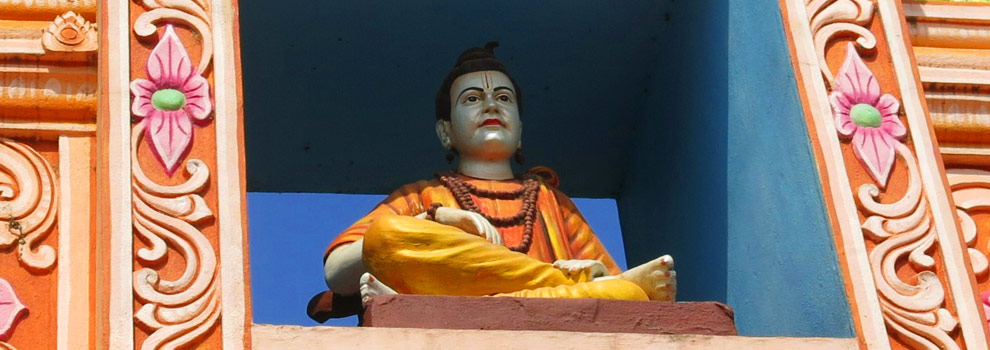Srīpāda Srīvallabha Charitāmrutam: The Author
“The Charitāmrutam is a live stream of a glorious consciousness.”
- Srīpāda
Acquiring the Srīpāda biography
Overview Charitāmrutam | The Book
The Reappearance of the Book
Statements | Dedicated Reading

“From the time I started from the Udipi area till I reached Kuruvapuram many wonderful and strange things were taking place. I wanted to write a book about them and obtain the permission of the Srīguru Sārvabhūma. I wanted to request Srīpāda in this regard after getting His dārshan.” – Shankar Bhatt.
The biography of Srīpāda Srīvallabha (1320 – 1350) was written by a contemporary, Shankar Bhatt. While introducing the topic of the book – the events around the first incarnation of Lord Dattatreya in Kali Yuga, the present Dark Age - he presents himself as coming from Karnataka, a state in the southwestern region of India. He calls himself an ignorant and illiterate person and humbly submits the entire work as an expression of Srīpāda’s divine will and blessing. Nevertheless, he is the author of a stupendous multi-faceted work of profound spirituality, well designed and written. Throughout the book he maintains the stance of a reporter who endeavours to objectively describe what he witnesses and hears. He tries not to judge but to record events and encounters. He notes down his own experiences as well as the descriptions and teachings he hears from others. He is not writing from the perspective of an uninvolved observer but rather allows us to participate in his inner processes – his questions and doubts, his crises and tribulations, his awe and astonishment.
He was already on a pilgrimage before he begins writing of the book. From his remarks we can infer that he already walked at least 1000 kilometres. He was following a hint from Srī Krishna to see the deity of Srī Kanyakā Paramēswari in a temple at the southernmost point of India. From her Shankar Bhatt receives the call to visit her brother Srīpāda Srīvallabha in Kuruvapuram. The place is located on an island in the Krishna River, in a distance of about 1200 kilometres. Shankar Bhatt has never heard of Srīpāda before but without any doubt he immediately starts his epic journey totalling several thousand kilometres. It is the year 1336 – Srīpāda has just disappeared from His birth place in Pīthikapuram and is at that time on a tour to Kashi (Benares) and the Himalayas by “yogic travelling”.
Shankar Bhatt is travelling by foot, sometimes by bullock carts or horse chariots – without luggage and money, not knowing how to reach the goal. He is living on alms and hospitality. He is sleeping at the places he comes along, experiencing hunger and life-threatening situations. He is walking alone or with co-travellers. He meets saints, frauds and robbers, farmers and merchants, kings, housewives and prostitutes. He encounters orthodox arrogance, sectarianism, lies, disputes, and even complots against Srīpāda, which the latter dissolves in surprising ways.
Shankar Bhatt is a Brahmin but his experiences teach him to overcome the barriers of caste and creed and feel the unity of all who are striving towards the divine. He undergoes deep transformations and is carried forward on his initiatory journey by a fiery aspiration which is strengthened by his encounters with sublime siddhas and yogis. He interrogates them about profound spiritual topics and above all about their experiences with the divine, with Srīpāda Srīvallabha. Often they knew beforehand through messages of Srīpāda or clairvoyant perceptions that Shankar Bhatt would be coming and they willingly share with him fantastic stories about Srīpāda’s effulgent presence and his miraculous playful pastimes. He gets insights into previous incarnations of people reaching far back in time. And he learns about Srīpāda’s announcements of His own future incarnations as Narasimha Saraswati (1378-1459) and Swamī Samartha ( - 1878). There are also many hints to future events some of which by now already belong to the past.
The book is full of unimaginable events, revelations and wonders, like cases of souls simultaneously incarnating in different bodies or numerous cases of bringing deceased persons back to life.
But the highlight is Shankar Bhatt’s personal encounter with Srīpāda, the goal of his search. The story does not end there. Shankar Bhatt continues his journey to other places Srīpāda sends him. Shankar Bhatt meets His family and friends and collects more astounding stories.
He finally comes to live with Srīpāda at Kuruvapuram. There, he looks after the numerous devotees coming to His wisdom teachings; he takes care of cooking and cleaning. When the food is not enough for all the visitors, Srīpāda sprinkles some water on it and it becomes inexhaustible.
Shankar Bhatt is a first-hand witness of how Srīpāda consults, consoles and heals full of love and affection. He works on the biography with a tremendous memory about names and details of events. He writes the Charitāmrutam on Bhūrja Patra, leaves of the Indian paper birch tree. And he writes it in Sanskrit. After the disappearance of Srīpāda, Shankar Bhatt continues to live in Kuruvapuram for three more years completing the text – and Srīpāda appears to him every night at midnight. He writes another book about his own inner experiences, which was taken by a yogi to the Himalayas, as it was predicted by Srīpāda.
Nothing is known about the rest of the life of Shankar Bhatt.
Continue: The Reappearance of the Book
Sources:
- Shankar Bhatt: Srīpāda Srīvallabha Charitāmrutam







